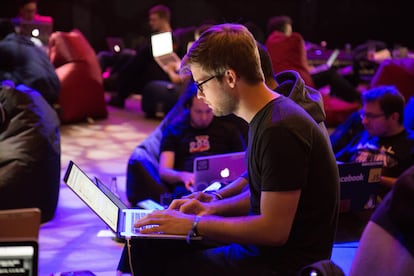Is antivirus software still essential?
Experts warn that users should not depend on these tools as their sole security measure, as threats continue to evolve

Half a century ago, the first computer antivirus software in history appeared: the program Reaper was made to attack Creeper, the first virus. Since then, as technology has become ubiquitous in our daily lives, digital threats have evolved. Developers of antivirus software have tried to adapt to new challenges. But the complexity of today’s attacks mean that users cannot simply delegate their safety to a program. They have to actively take precautionary measures while using their devices. “A lot of people think that paying for an antivirus will automatically protect them, but that isn’t necessarily the case. Investing in it doesn’t mean they will be protected,” says Josh Brunty, digital forensics expert and professor at Marshall University in West Virginia.
Ángela García Valdés, Cybersecurity Technician at Citizens of Spain’s National Institute of Cybersecurity (INCIBE), insists that we should have an antivirus “on all our devices, even on smart TVs.” She agrees, though, that ‘’this does not mean that we have everything covered. We have to continue to use the internet safely and responsibly.” Her recommended measures include using difficult-to-guess passwords, two-factor authentication where possible, downloading applications only from official stores (the Play Store and App Store, depending on the operating system) and avoiding unreliable web pages.
“An antivirus is going to address problems that aren’t complex attacks. But it’s worth installing even if it only eliminates a simple virus that can ruin your day,” explains cybersecurity expert Javier Tobal. “How much effort do you need to install an antivirus? It takes two seconds,” he says.
Some experts, including Josh Brunty, believe that devices’ built-in security systems, such as Windows Defender, are sufficient as long as users take their own safety measures. They argue that it is not essential to install a third-party antivirus software, much less a paid version: what is most essential is to understand the threats. Brunty warns that, by requesting the services of an antivirus, “you may be duplicating what you already have, something that is already integrated, as in the case of Defender, at least if it is activated properly.”
Antivirus software companies argue that their products offer “additional layers of security to those that the operating system itself has,” as explained by Josep Albors, Head of Awareness and Research at the Spanish computer security company ESET. “They always give you the possibility of buying one for a fee. They do that for a reason,” he says. The extended version usually includes the possibility to receive technical support in the same language and from the same country at almost any time, as well as the installation of patches or remote management functions. Albors laments that “this service is rarely valued until something happens.”
Albors explains that attackers often exploit system-specific security tools for their benefit. “It can be much easier for an attacker to bypass a system integrated into the operating system itself, than a third-party system that is specialized in cybersecurity,” he says.
Europe is the region with the second-largest antivirus market share in the world, ranking behind the United States, according to the report “Global Antivirus Software Market 2021: COVID-19 Growth and Change” by ResearchAndMarkets.com. This market made more than €3 billion in 2021, and the business is expected to increase to $4.3 billion in 2025. According to a study by Security.org, American households that pay for an antivirus outnumber those with a free version by nearly 10 million. The company calculates that 8.9% of users with a free version suffered from some malware in 2021, compared to 7.4% of those who had a paid version.
According to the same study, three out of four users in the US continue to use antivirus software, despite the fact that more and more software companies offer the service. Javier Tobal says that Microsoft’s antivirus service “comes out very well in independent analyses, just like the Macbook’s. The good thing about it is that you activate it and forget about it, and it does not offer much less protection than the others.”
Valdés, of INCIBE, notes that antiviruses “offer many more services. They serve as firewalls, include anti-spam filters and optimize computer performance. Some analyze web addresses and even have parental control tools. Each user has to evaluate what they want and need.”
Tu suscripción se está usando en otro dispositivo
¿Quieres añadir otro usuario a tu suscripción?
Si continúas leyendo en este dispositivo, no se podrá leer en el otro.
FlechaTu suscripción se está usando en otro dispositivo y solo puedes acceder a EL PAÍS desde un dispositivo a la vez.
Si quieres compartir tu cuenta, cambia tu suscripción a la modalidad Premium, así podrás añadir otro usuario. Cada uno accederá con su propia cuenta de email, lo que os permitirá personalizar vuestra experiencia en EL PAÍS.
¿Tienes una suscripción de empresa? Accede aquí para contratar más cuentas.
En el caso de no saber quién está usando tu cuenta, te recomendamos cambiar tu contraseña aquí.
Si decides continuar compartiendo tu cuenta, este mensaje se mostrará en tu dispositivo y en el de la otra persona que está usando tu cuenta de forma indefinida, afectando a tu experiencia de lectura. Puedes consultar aquí los términos y condiciones de la suscripción digital.









































